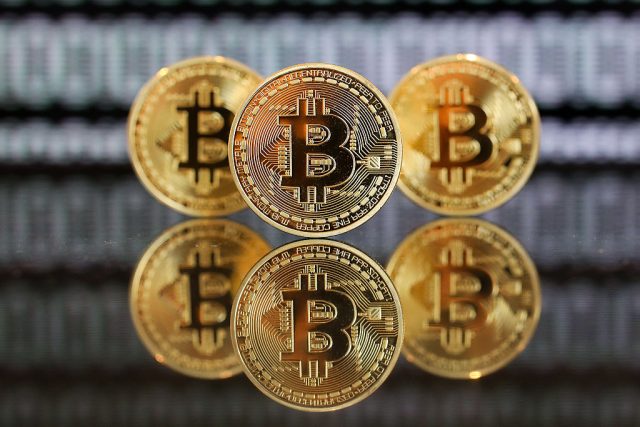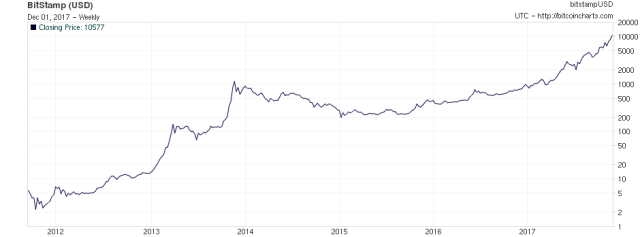Bitcoin's price hit a new record this week, soaring above $11,000 on Wednesday morning. The price has been a roller coaster since then, with the price briefly dropping to $9,000 later on Wednesday before regaining much of its lost value in recent days.
The currency's astonishing gains—it was worth less than $1 in early 2011—has caused a lot of people to wonder if they should be paying attention to the technology. Coinbase, a popular service for trading dollars and bitcoins, now says it has more than 13 million users. While almost everyone has heard of Bitcoin at this point, many people are fuzzy on the details: what is a bitcoin, exactly? How do I buy some? What would I use it for?
We're here to help. Read on for a beginner's guide to bitcoin. We'll explain what Bitcoin is, how it works, and what ordinary people should know about the technology.
1) What's a Bitcoin?

The term Bitcoin actually refers to two different things. Capital-B Bitcoin is a payment network—like MasterCard is a payment network. Lower-case bitcoin refers to the currency of the Bitcoin network—much like MasterCard uses dollars in the United States.
What makes Bitcoin different from MasterCard, PayPal, and other payment networks that existed in 2008 (when Bitcoin was invented) is that Bitcoin was the world's first payment network that's completely decentralized. The MasterCard network is operated by MasterCard Inc., but there's no Bitcoin Inc. in charge of the Bitcoin network. Rather, it's a peer-to-peer network that maintains a shared transaction ledger called the blockchain.
Inventing a new currency was an unavoidable consequence of making the Bitcoin network fully decentralized. On a conventional payment network, the network owner promises to redeem balances for conventional currencies like dollars or euros. But there's no Bitcoin company, so there's no one to guarantee that Bitcoin balances will have any particular value. Instead, bitcoins float against conventional currencies, with their value determined by supply and demand.
And no, those physical "bitcoins" you see in a lot of pictures aren't what a bitcoin "really" looks like. Bitcoins are just entries in the Bitcoin blockchain. If you own some bitcoins, that means you have some cryptographic private keys stored on your computer, on an external drive, or printed out on a piece of paper somewhere. These keys allow people to spend bitcoin balances in much the same way that the password to your bank's website allows you to spend the balance in your bank account. But you can't withdraw bitcoins from the network the way you withdraw physical currency from your bank.
2) If Bitcoins aren't tied to a conventional currency, how did they get so valuable?

Good question! When the Bitcoin network was first created in 2009, bitcoins were barely worth anything. Bitcoin lore holds that the very first real-world Bitcoin transaction occurred in May 2010, when one early Bitcoin user paid another user 10,000 bitcoins for two pizzas. At the time, Bitcoins were trading for less than a penny each.
But as the Bitcoin community grew, the currency's value steadily climbed. By the time I started paying attention to Bitcoin in April 2011, its value had climbed to $1. This was at the start of the first great Bitcoin bubble. Media coverage of Bitcoin attracted new users, which caused the price to rise. The rising price, in turn, attracted more media interest. The value rose to more than $30 by June, before it crashed and fell to $2 before the end of 2011.
This cycle repeated two more times in 2013. In May 2013, Bitcoin's price briefly rose above $250, before falling by about 80 percent. Then in late 2013, Bitcoin's price rose above $1,000 before once again crashing by 80 percent. The current boom—which has taken the currency from a low of $200 in early 2015 to a high above $10,000 in recent days—is the fourth major Bitcoin boom.
Each of these booms—and, for that matter, most bubbles throughout history—has been driven by the same basic publicity-price feedback loop. As an Internet writer, I've seen this process first hand. During times when the price is rising, there's a lot of traffic to be had writing about Bitcoin, so reporters like me write articles (like this one!) about it. The articles cause more people to pay attention to the currency, and some of those people decide to buy. That pushes the price up even more, triggering more media coverage and more public interest.
This bootstrapping process has achieved something that most people—including me—would have thought was impossible a decade ago: a valuable currency that's neither backed by a commodity like gold or silver, nor by a powerful institution like a government or bank. On one level, Bitcoin's value is rising simply because more and more people are betting that its value will continue to go up over time. The question, of course, is whether they're right about that.
Bitcoin's price hit a new record this week, soaring above $11,000 on Wednesday morning. The price has been a roller coaster since then, with the price briefly dropping to $9,000 later on Wednesday before regaining much of its lost value in recent days.
The currency's astonishing gains—it was worth less than $1 in early 2011—has caused a lot of people to wonder if they should be paying attention to the technology. Coinbase, a popular service for trading dollars and bitcoins, now says it has more than 13 million users. While almost everyone has heard of Bitcoin at this point, many people are fuzzy on the details: what is a bitcoin, exactly? How do I buy some? What would I use it for?
We're here to help. Read on for a beginner's guide to bitcoin. We'll explain what Bitcoin is, how it works, and what ordinary people should know about the technology.
1) What's a Bitcoin?

The term Bitcoin actually refers to two different things. Capital-B Bitcoin is a payment network—like MasterCard is a payment network. Lower-case bitcoin refers to the currency of the Bitcoin network—much like MasterCard uses dollars in the United States.
What makes Bitcoin different from MasterCard, PayPal, and other payment networks that existed in 2008 (when Bitcoin was invented) is that Bitcoin was the world's first payment network that's completely decentralized. The MasterCard network is operated by MasterCard Inc., but there's no Bitcoin Inc. in charge of the Bitcoin network. Rather, it's a peer-to-peer network that maintains a shared transaction ledger called the blockchain.
Inventing a new currency was an unavoidable consequence of making the Bitcoin network fully decentralized. On a conventional payment network, the network owner promises to redeem balances for conventional currencies like dollars or euros. But there's no Bitcoin company, so there's no one to guarantee that Bitcoin balances will have any particular value. Instead, bitcoins float against conventional currencies, with their value determined by supply and demand.
And no, those physical "bitcoins" you see in a lot of pictures aren't what a bitcoin "really" looks like. Bitcoins are just entries in the Bitcoin blockchain. If you own some bitcoins, that means you have some cryptographic private keys stored on your computer, on an external drive, or printed out on a piece of paper somewhere. These keys allow people to spend bitcoin balances in much the same way that the password to your bank's website allows you to spend the balance in your bank account. But you can't withdraw bitcoins from the network the way you withdraw physical currency from your bank.
2) If Bitcoins aren't tied to a conventional currency, how did they get so valuable?

Good question! When the Bitcoin network was first created in 2009, bitcoins were barely worth anything. Bitcoin lore holds that the very first real-world Bitcoin transaction occurred in May 2010, when one early Bitcoin user paid another user 10,000 bitcoins for two pizzas. At the time, Bitcoins were trading for less than a penny each.
But as the Bitcoin community grew, the currency's value steadily climbed. By the time I started paying attention to Bitcoin in April 2011, its value had climbed to $1. This was at the start of the first great Bitcoin bubble. Media coverage of Bitcoin attracted new users, which caused the price to rise. The rising price, in turn, attracted more media interest. The value rose to more than $30 by June, before it crashed and fell to $2 before the end of 2011.
This cycle repeated two more times in 2013. In May 2013, Bitcoin's price briefly rose above $250, before falling by about 80 percent. Then in late 2013, Bitcoin's price rose above $1,000 before once again crashing by 80 percent. The current boom—which has taken the currency from a low of $200 in early 2015 to a high above $10,000 in recent days—is the fourth major Bitcoin boom.
Each of these booms—and, for that matter, most bubbles throughout history—has been driven by the same basic publicity-price feedback loop. As an Internet writer, I've seen this process first hand. During times when the price is rising, there's a lot of traffic to be had writing about Bitcoin, so reporters like me write articles (like this one!) about it. The articles cause more people to pay attention to the currency, and some of those people decide to buy. That pushes the price up even more, triggering more media coverage and more public interest.
This bootstrapping process has achieved something that most people—including me—would have thought was impossible a decade ago: a valuable currency that's neither backed by a commodity like gold or silver, nor by a powerful institution like a government or bank. On one level, Bitcoin's value is rising simply because more and more people are betting that its value will continue to go up over time. The question, of course, is whether they're right about that.











